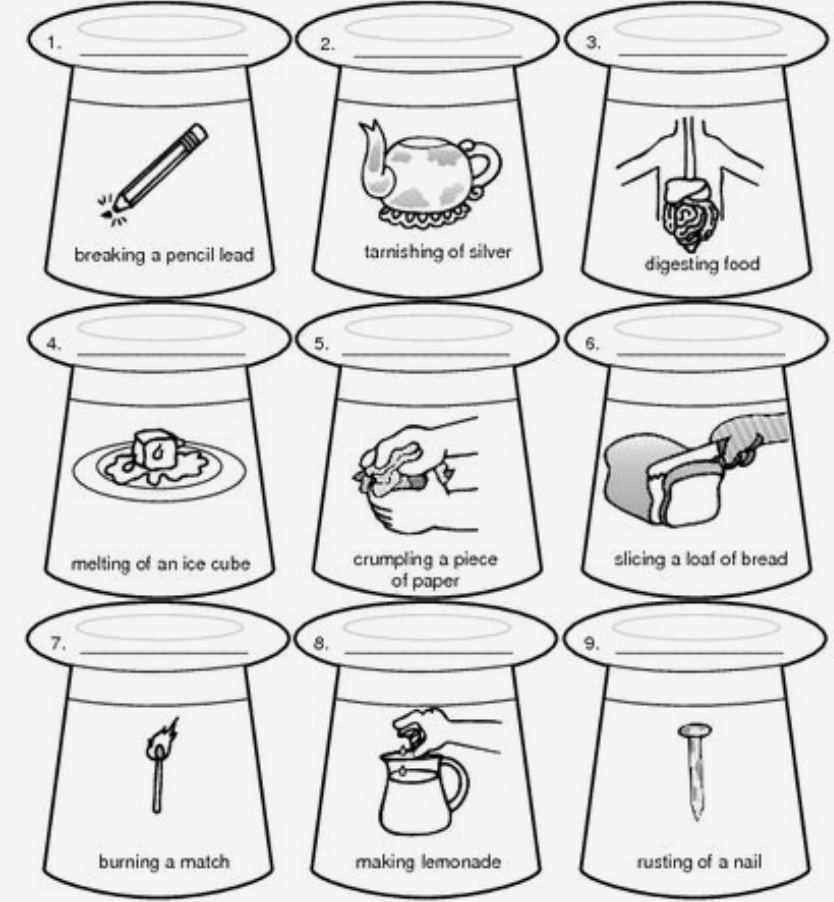DOUBLE POINTS
What is Mass?
What is volume?
The amount of matter in a substance.
The amount of space a substance occupies.
What has more thermal energy, a lit match? or the chair your sitting in right now?
The chair!
Which heat transfer method involves direct contact.
Conduction
What is the simplest form of matter that is considered a pure substance?
Element
What 4 elements are found in abundance in Earth's Oceans?
Sodium, Chlorine, Hydrogen, Oxygen
What type of change is REVERSIBLE?
Physical changes.
What formula is used to calculate density?
Density = Mass / Volume
What are the 3 common states of matter and how do their molecules act? (think movement and energy)
Solid - Minimal movement / least amount of energy
Liquid - More movement / more energy
Gas - Most movement / most energy
What is the average kinetic energy of molecules in an object?
Temperature
Explain thermal conductivity.
What is the difference between a compound and mixture?
What abundant element can be found in the Earth's crust, oceans, and atmosphere, as well as in all living things.
Oxygen
What are three ways in which physical properties can be measured?
Size, shape, odor, density, color, texture, luster, solubility, malleability, conductivity, temperature, etc.
Which object is the most dense?
Grape
Name 4 physical changes that occur during a transfer of thermal energy.
DOUBLE POINTS - If you name all 6.
Melting, Freezing, Condensing, Vaporizing, Sublimation, Deposition.
What direction does heat flow?
Double Points - When does it stop flowing?
From hot to cold
At equilibrium
Which heat transfer method allows for hot air balloons to travel up?
Convection
Explain the difference between a homogenous mixture and heterogenous mixture.
Double Points - Give an example of each.
Homogenous- Same throughout
Heterogenous - Different throughout.
Earth's Atmosphere is mostly made up of what two elements?
Double Points - What percentages of each?
Nitrogen - 78%
Oxygen - 21%
What type of properties can only be measured when matter changes?
Chemical
The mass of an object is 144 grams and the volume is 12 cm3, what is the density?
12 g/cm3
Matter is in constant motion. The _______ the amount of energy, the _______ molecular motion.
Greater, Greater
What is the theoretical temperature at which all matter stops moving?
Absolute Zero or 0 Kelvin
Explain why Hampton, Va receives fewer snow events that Richmond, Va.
Water has greater HEAT CAPACITY and Hampton being closer to the ocean is warmer on average than Richmond because it is further inland.
What are two parts of a solution. Explain each part.
Solvent - Does the dissolving
Solute - Gets dissolved
Name 3 of the 5 abundant elements found in the Earth's Crust.
Double Points - Name all 5.
Oxygen, Aluminum, Iron, Silicon, Calcium
Identify all the changes as Physical or Chemical.
**Flip to next slide**

Identify the density of the irregular shaped object if the mass of the object is 120 grams.
4 g/mL
The fourth state of matter is _______. Explain it in detail.
Plasma - gas with an electric charge (ionized)
What are 2 temperature scales commonly use around the world outside of a lab setting? and what is the freezing point of each.
Celsius - 0 degrees Celsius
Fahrenheit - 32 degrees Fahrenheit
Name all three heat transfer methods and provide an example for each.
Conduction
Convection
Radiation
Name 3 methods to separate mixtures.
Magnets, Filters, Evaporation, Physical Separation, etc.
What four elements are found in abundance in all living things?
Oxygen, Hydrogen, Carbon, Nitrogen
Name 2 types of chemical properties that can be measured or observed only when matter changes.
Change of color, change of odor, combustion, reactivity, flammability, corrosiveness, etc.
The side of a cube is 5cm, and the mass is 25 grams. What is the density?
.20 g/cm3
or
1/5 g/cm3